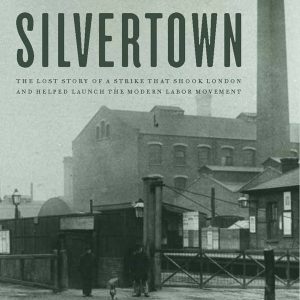Issue No. 280-July 2014
By Terry Irving
John Tully, Silvertown – The Lost Story of a Strike that Shook London and Helped Launch the Modern Labour Movement (New York: Monthly Review Press, 2014)
John Tully begins his marvellous book by recreating the day in 1889 when the yardmen at Silver’s India-Rubber, Gutta-Percha and Telegraph works submitted a written petition to management for a pay rise. He imagines them emboldened by the long struggle of 16,000 workers in the neighbouring Royal Docks for ‘the dockers’ tanner’, and by the earlier victories of the ‘little match girls’ at Bryant and May’s and the gas workers at Beckton. A New Unionism for the labouring masses was emerging, and they would be part of it. Soon 3,000 workers at Silver’s, desperate for better conditions and higher wages, would join the struggle, led by Will Thorne’s newly formed socialist union of gas workers and general labourers. Tom Mann and Eleanor Marx were there, the latter forming a women’s branch of the union, but the strike committee of Silver’s workers led the struggle. What they did and how they were defeated after twelve bitter weeks is the story that John Tully goes on to tell.
He begins by describing the firm, which was at the cutting edge of the telegraphic and electrical revolutions and thus enormously profitable, and its place in the political economy of Britain’s imperial system. He contrasts the obscene wealth of the firm’s owners and the appalling living conditions of its workers, whose infants died at a faster rate than children in the most oppressed countries today. Then we reach the moment of hope: the strike begins just as the dockers win their demand for sixpence an hour. We learn what impelled the men, women and children at Silver’s to strike: the harsh work rules and punishments, the unhealthy work, the starvation wages. Some workers, the fitters and turners who maintained the machinery, received better treatment, and because their union, the Amalgamated Society of Engineers, dominated by ‘labour aristocrats’, refused to instruct their members to join the strike, production at Silver’s continued. So class betrayal corroded the struggle. But what ultimately doomed it was the ruling class’s determination to stop the advance of the New Unionism. The company used its connections with the government and the press, and worked out a repertoire of oppression that employers, judges, press barons and coppers would deploy time and again over the next decade, ‘the Silvertown formula’: refuse to recognise unions, to negotiate or accept arbitrators; recruit scabs en masse and billet them on site; intimidate strikers with police and soldiers, take them to court, and use the press to depict the strikers as thugs depriving ‘free labourers’ of the right to work. Sounds so familiar now.
John Tully tells the story with passion and purpose, which is how labour history ought to be written. He tells it at a cracking pace when events move fast, but also with seductive changes of ‘voice’, sometimes imagining the mood of the people, sometimes describing the setting and explaining ideas, and sometimes justifying his partisan position and choice of method.
Hitler’s bombs and Thatcher’s de-industrialisation destroyed Silvertown, the grim East End suburb on the Thames where these brave people lived and worked, but their struggle “helped build a movement that recast the face of Britain”. And there are lessons to be learnt or re-learnt. He writes: “Those who today resist what is in effect the declaration of class war by a feral ruling class may find inspiration in the story of these forgotten labourers over 120 years ago”. Right on!
Terry Irving is a radical educationist and historian who taught history and politics at the University of Sydney. He was one of the founders of the Free University (Sydney) and a prominent New Left figure in the labor history movement in Australia. He writes in the radical history tradition about class analysis, youth politics, labor intellectuals and radical democracy. His most recent book (with Rowan Cahill) is Radical Sydney: Places, Portraits and Unruly Episodes (2010). He is currently Visiting Professorial Fellow at the University of Wollongong.

Comments are closed.